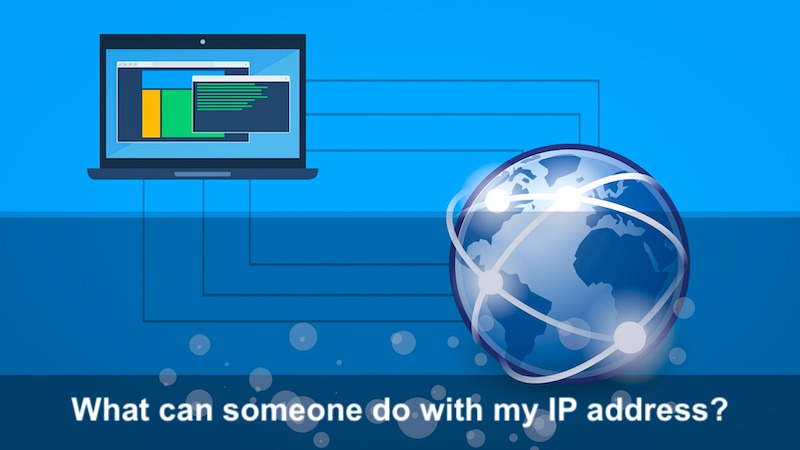
When you connect to the Internet, your service provider assigns an IP address to your device. The device can be a computer, smartphone, tablet, or any computing device communicating with other devices on the Internet. The IP address is your online identity, and whenever you exchange information with other devices and the other party will be able to find your IP address.
How can someone find my IP address?
There are several ways someone may be able to find your IP address:
- Communication: When you exchange email, use instant messaging, or play online games; your IP address may be visible to the recipient, or server administrator. You may use our online Trace Email tool to trace the source of the email sender.
- Website visits: When you visit a website, your IP address is logged by the hosting server. Website administrators can see the IP addresses of visitors to their site and potentially use them for tracking and analysis purposes.
- Social Media: Some online forums and social media may reveal your IP address to other participants or administrators, depending on their privacy settings and policies. Also, placing a shortened URL on social media allows them to track your IP address when you click on the link.
- Phishing attacks: When a malicious actor sends you a phishing or smishing message, and you click on the bogus link will reveal your IP address.
- Peer-to-peer networks: When you use peer-to-peer (P2P) file-sharing applications, your IP address may be visible to others who are sharing files with you.
- Malicious software: If your device is infected with malware, an attacker could potentially track your IP address, among other sensitive information.
- Network sniffing: In unsecured networks, such as public Wi-Fi hotspots, someone with the appropriate knowledge and tools could potentially intercept network traffic and obtain your IP address.
Is someone tracing my IP address legal?
Yes, anyone can trace anyone's IP address, and they are available for free. Tracking an IP address does not reveal a person's identity, so as long as the information is not used in criminal activities tracing an IP address is legal.
Also, the IP address is public information you can find by using any of the methods described above. An IP address is assigned to ISPs, and an ISP reassigns an IP address to its customer like yourself. You can also change your IP address by resetting your router, or restarting your smartphone and obtaining a brand new IP address.
What can someone do with my IP address?
While an IP address alone doesn't reveal your identity or precise location, there are some tools an individual can use to learn more about your IP address.
- Geolocation: Your IP address can reveal the approximate geographic location (such as city or region) of the device connected to the internet.
- Track your activities: Website owners and gaming applications can see the IP addresses of visitors, allowing them to track unique visits and potentially identify trends in user behavior.
- Restrict access: Some online services or gaming sites may restrict access based on IP addresses to enforce Internet Censorship on content, ban illegal activities, or prevent spams. IP addresses can also be used as a factor in access control policies, restricting access to sensitive systems or data based on the Privileged Identity Management (PIM) systems.
- Targeted attacks: Malicious actors may target your IP address, or use your IP address to conduct targeted cyberattacks, such as DDoS attacks.
- IP address lookup: Using an IP address lookup tool, someone may be able to gather additional information related to your IP address, such as the hostname, ASN, and ISP.
An IP address alone does not disclose your personally identifiable information (PII), and having someone's IP address doesn't mean you can access their personal data or devices directly.
How do I protect my IP address?
The IP address you're using is owned by your ISP, and there is nothing you can do to protect your IP address. The only thing you can do is to hide your IP address wherever possible and maintain privacy online. Here are some things you can do to maintain privacy while using online services.
- Enable privacy settings: Ensure that your browser's privacy settings are enabled and properly configured to minimize data collection and protect your online activities. Consider using privacy-focused browsers like Brave, Firefox, or Tor Browser.
- Be cautious with public Wi-Fi: Avoid using public Wi-Fi networks without a VPN, as your IP address and other sensitive information can be easily intercepted on unsecured networks.
- Keep your software updated: Regularly update your operating systems, firmware, and applications to ensure that known security vulnerabilities are patched and your privacy is maintained.
- Use a firewall: A firewall helps protect your devices from unauthorized access and can help conceal your IP address by filtering incoming and outgoing traffic.
Leveraging cloud services for your business offers a myriad of benefits including IP protection in today's fast-paced digital landscape. Cloud services eliminate the need for costly on-premises infrastructure, allowing businesses to significantly reduce capital expenditures while improving operational efficiency. For those businesses managing cloud services, Microsoft AZ-900 Practice Test Dumps will benefit from enhanced scalability, improved data security, and streamlined operations.
Conclusion
An IP address is your identity when connected to the Internet, and it is public information available to anyone. However, if someone finds your IP address, they can find a little more about your location, ISP, and other public information but not personally identifiable information.
To protect your privacy and reduce the chances of your IP address being discovered, consider using a VPN, a proxy server, or the Tor network to hide your IP address while browsing the internet. Additionally, be cautious when sharing personal information online, and keep your devices updated with the latest security patches.
Share this post
Leave a comment
All comments are moderated. Spammy and bot submitted comments are deleted. Please submit the comments that are helpful to others, and we'll approve your comments. A comment that includes outbound link will only be approved if the content is relevant to the topic, and has some value to our readers.




Comments (0)
No comment